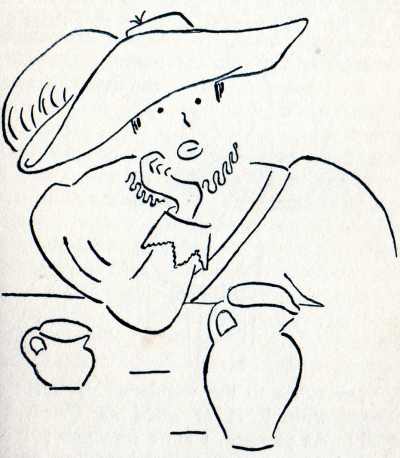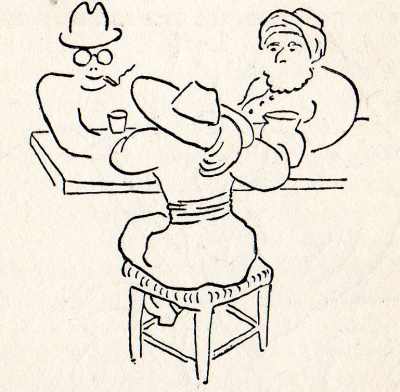Chapter Six – Posada de la Sangre
Posada de la Sangre - Tavern at the sign of the blood.
It was here that Don Miguel de Cervantes Saavedra lived, drank, ran into debt and wrote his “Exemplary Tales.” In Seville there is another inn, where he also drank and wrote, and a prison where he served a sentence for debt; to-day, however, this prison is a tavern.
On the basis of my own investigations I can prove to all and sundry that, while he drank Manzanilla and crunched langostinos with it in Seville, he treated himself to Toledan wine in Toledo and did justice to the chorizo with paprika and the jamon Serrano or black raw ham and other things which accompanied it, and which promote thirst, talent and eloquence.
Until this very day Toledan wine is drunk from flagons and chorizo is munched in the Posada de la Sangre, while in the yard the caballeros unharness the donkeys and bandy jokes with the girls, just as they used to do at the time of Don Miguel. Which only shows the genius of Cervantes is unfading.
But while we are in the tavern, oiga, viajero; you must eat and drink your way through distant countries, to get to know them properly; and the more distant the countries are, the more, under God, you must eat and drink your fill.

And you will discover that all the nations in the world, down to the Saxons and Brandenburgers, have sought by sundry ways and means, as well as by sundry spices and processes, to achieve paradise on earth; wherefore they set to work baking, brazing and pickling the most diverse foods so as to achieve temporal bliss.
Every nation has its own tongue, and indeed it's own daintiness of tongue. Get to know its tongue; eat its foods and drink its wines. Attune yourself whole-heartedly to the harmonies of its fish and cheeses, its oil and smoked meats and bread and fruit, amid the orchestral accompaniment of its wines, which are as numerous as musical instruments. There are wines as penetrating as a Basque reed-pipe, as harsh as vendas, as deep as guitars; so play your tunes to the wanderer, ye warm and sonorous wines! A la salud de Usted, Don Miguel!

As you see, I am a foreigner; I have crossed three countries to get here, but perhaps I could make friends with you all the same, Good, pour me out some more.
You know, you Spaniards have a number of things in common with us Czechs; for example, you have the same ch as we have, and our fine, hearty rrr and you are fond of diminutives, just as we are; a la salud de Usted. You ought to pay a visit to our country, Mr. Cervantes; we would drink to your health with beer with white froth, and we would pile up your plate with other foods than these, for each nation has its own tongue, but we can make ourselves understood where sound and fundamental matters are concerned, such as a good tavern, realism, the arts and freedom of the spirt. A la salud.
